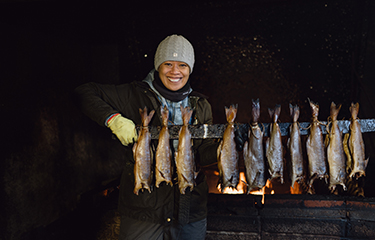Ambassadors, product endorsers, and brand promoters are commonplace in today’s seafood marketplace, but their performance doesn’t always match up to the the cost of engaging them.
According to Danish media company Influencer Marketing Hub (IMH), ambassador marketing is a winning strategy – if done correctly.
“Ambassador marketing will always win over paid advertising because of the authenticity of the people involved. Nowadays, people are cynical and disbelieving of advertising and are far more willing to believe what they hear from people they perceive as peers,” IMH said in a statement.
According to IDH, consumers tend to be cynical of celebrity chefs and other high-profile figures endorsing products, unless they have specific knowledge of the product or sector.
One organization putting its faith in a high-profile celebrity is trade promotion body Seafood from Scotland, which in 2022 signed an ambassador deal with former “MasterChef: The Professionals” judge Monica Galetti. Her role is to encourage buyers, restaurant owners, and chefs in the U.K. to serve more Scottish seafood.
Beginning her new role in July 2022, Galetti first traveled around Scotland, meeting oyster and salmon farmers and visiting fishers, markets, processors, and fish smokers, before heading back to her London restaurant to develop recipes, host private seafood dinners, and take part in media outreach promoting Scottish seafood.
“I have been using Scottish seafood in the restaurant for a few years and was delighted to be asked to spread the word to the next generation of chefs about the quality and range of fish and shellfish available. I really think it is the best in the world and it’s heartbreaking that so much of it is exported,” Galetti told SeafoodSource.
In Ireland, Killybegs-based Shines Seafoods recruits four new product ambassadors every six months through its website, and is also seeking a restaurant ambassador for the first time this year. Shines Seafoods Managing Director John Shine said he has tried using high-profile influencers, but said the expense didn’t convert to an uplift in sales.
“Our best results have been from people who are active on social media, have a real interest in the product, and who really engage with their followers,” he told SeafoodSource. “We look for everyday folk, the sort that consumers can relate to. People like home cooks, home economics teachers, and busy mums who love to cook and blog. They need to be genuinely passionate about seafood and keen to learn about our products. We show them how we prepare our Irish albacore tuna, mackerel, and sardines, explain why premium tinned seafood makes such a great meal ingredient, and leave them to come up with new recipes and promotional ideas.”
Shine said some of the best promoters of locally-caught seafood in Ireland are those directly involved in the industry itself. He and daughter, Ciara, set up a pop-up shop and tasting room in Killybegs last year, which has received positive reviews, been good for growing brand recognition, and is being sought out by tour operators, he said.
“Many adults in Ireland have fallen out of love with seafood because they have memories of the poor-quality, badly-handled fish they grew up eating every Friday. I reckon that our younger generation now know more about the Kardashians than seafood, and for an island nation that is embarrassing,” he said. “Seventy-five percent of all the fish we eat here is imported, but we need to nurture what we have, because it’s so important for food security.”
On a different scale, the Marine Stewardship Council (MSC) annually appoints a host of ocean ambassadors including award-winning chefs, adventurers, and photographers. Mitch Tonks, the founder and CEO of the Rockfish Group, which operates a dozen seafood restaurants in southern England, has been an ambassador for the MSC for the past six years. Even though the role is unpaid, Tonks sees it as an extension of his business.
“I take no commercial gain from this role, and I believe that it makes what I say and do more credible,” he said. “I know that others accept a fee, but as a huge supporter of the MSC, I believe it would be disingenuous of me.”
Tonks talks from the heart about the need for sustainability and quality, and promotes this ethos through his restaurants and seafood home-delivery business. He also ensures that his staff are knowledgeable on the subject.
“More than 80 percent of the seafood served in our restaurants is MSC-certified, and the remainder is landed locally in Brixham, U.K. I hope that by promoting this model, I can inspire others to do the same, and help protect the seafood in our oceans,” he said.
Yet another model is being employed in Canada by the Nova Scotia Seafood Quality Program, which aims to enhance the reputation of the province by maintaining high standards for its seafood products, and uses certified-compliant companies as ambassadors. In return, the companies – seven so far – receive branded marketing materials, become recommended suppliers on the province’s seafood marketing website, and benefit from taking part in strategic global marketing campaigns for their lobster, shrimp, snow crab, and oysters.
“By strengthening their quality standards, companies can provide sustainability, food safety, and healthy options that influence buying decisions in the global market,” Nova Scotia Fisheries and Aquaculture Minister Steve Craig said at the launch of the initiative. “Certification raises the profile of Nova Scotian seafood companies and their products in a market that is fast-changing and competitive.”
Photo courtesy of Seafood from Scotland







